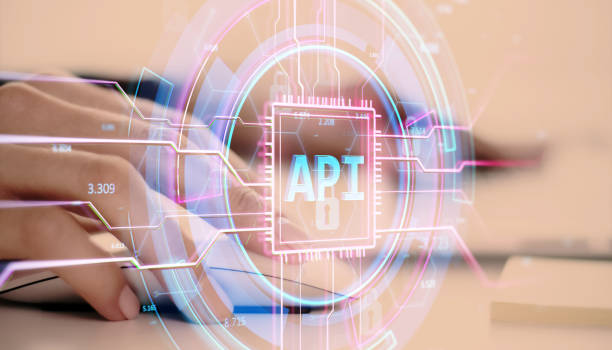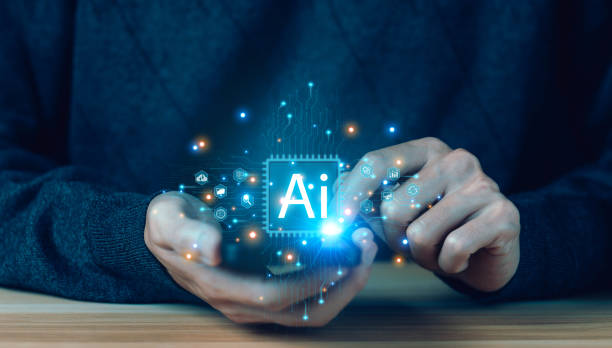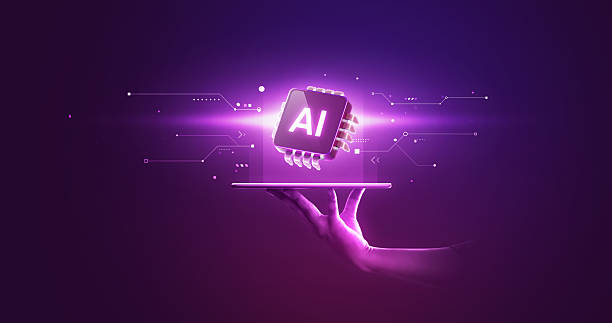What is Artificial Intelligence? Definition, History, and Basic Concepts

#Artificial_Intelligence (AI) is a branch of computer science that deals with creating machines capable of performing tasks that typically require human intelligence.
This general definition encompasses a wide range of activities, from playing chess to facial recognition and autonomous driving.
To better understand AI, it is necessary to become familiar with its history, concepts, and different types.
The history of AI dates back to the 1950s, when researchers first became interested in the idea of whether machines could be built to think.
Alan Turing, one of the pioneers in this field, proposed an experiment known as the “Turing Test,” which is considered a criterion for machine intelligence.
Basic AI concepts include Machine Learning, Deep Learning, Neural Networks, and Natural Language Processing (NLP).
Each of these concepts has its own specific tools and techniques used to solve various problems. The main goal of AI is to create systems that can learn, reason, and make decisions independently, just like humans.
AI has many capabilities that can significantly improve lives and businesses.
Artificial Intelligence
Is your e-commerce website ready to attract maximum customers and boost sales? Rasaweb transforms your online business with modern and efficient e-commerce website designs.
✅ Increased speed and improved SEO
✅ Excellent user experience on mobile and desktop⚡ Get a free e-commerce website design consultation from Rasaweb!
Types of Artificial Intelligence: Exploring Different Approaches

Artificial intelligence can be categorized based on various criteria.
One of the most common classifications is based on AI’s capability and performance.
Accordingly, AI is divided into two main categories: Narrow AI and General AI.
Narrow AI, also known as weak AI, is designed to perform a specific task.
This type of AI is present in many of our daily applications, including voice assistants like Siri and Alexa, movie recommendation systems on Netflix, and facial recognition systems on smartphones.
General AI, also known as strong AI, is a type of artificial intelligence capable of performing any intellectual task that a human can.
This type of AI is still in the research phase, and no real-world examples currently exist.
Another way to categorize AI is based on how it learns.
According to this, AI is divided into three main categories: Supervised Learning, Unsupervised Learning, and Reinforcement Learning.
In supervised learning, the machine is given a dataset with labeled data, and it learns to map inputs to outputs based on these labels.
In unsupervised learning, the machine is given a dataset without labels, and it learns to discover hidden patterns and structures within the data.
In reinforcement learning, the machine learns by interacting with its environment to maximize a specific goal.
Applications of Artificial Intelligence in Today’s World

#AI_applications are vast and diverse, affecting almost all industries and aspects of our lives.
In the medical field, AI is used for diagnosing diseases, developing drugs, and providing personalized healthcare.
In finance, AI is used for fraud detection, risk management, and providing automated financial services.
In transportation, AI is used for developing self-driving cars, improving traffic flow, and optimizing supply chains.
In education, AI is used for providing personalized learning, assessing students, and automating administrative tasks.
In manufacturing, AI is used for automating production processes, improving product quality, and reducing costs.
These are just a few examples of the countless applications of AI in today’s world.
With the continuous advancement of AI, its applications are expected to become even broader and more diverse in the future, bringing about significant transformations in lives and businesses.
| Field | Application |
|---|---|
| Medicine | Disease diagnosis, drug development |
| Finance | Fraud detection, risk management |
| Transportation | Self-driving cars, traffic improvement |
Machine Learning: The Beating Heart of Artificial Intelligence

Machine learning is one of the most important subfields of artificial intelligence that enables machines to learn from data without explicit programming.
In essence, machine learning is a set of algorithms and techniques that allow machines to identify patterns and relationships within data and make new predictions or decisions based on these patterns.
Machine learning is divided into three main categories: supervised learning, unsupervised learning, and reinforcement learning.
In supervised learning, the machine is given a set of labeled data, and it learns to establish a relationship between the data and the labels.
For example, if we provide the machine with a collection of dog and cat images labeled “dog” and “cat,” it will learn how to distinguish between dogs and cats.
In unsupervised learning, the machine is given a set of unlabeled data, and it learns to discover hidden patterns and structures within the data.
For instance, if we provide the machine with data related to customer purchasing behavior, it can identify different customer groups based on their buying patterns.
In reinforcement learning, the machine learns by interacting with its environment to maximize a specific goal.
For example, if we allow the machine to play a game, it learns how to win the game.
Are you worried about losing customers because you don’t have a professional e-commerce website?
With e-commerce website design by Rasaweb, forget these worries!
✅ Significant increase in conversion rates and sales
✅ Unparalleled and engaging user experience
⚡ Get a free consultation from Rasaweb
Deep Learning: A Deeper Level of Learning

Deep learning is one of the most advanced branches of machine learning that uses artificial neural networks with multiple layers to learn from data.
These networks, also known as deep neural networks, are capable of learning complex patterns and features in data that are not discernible by traditional machine learning algorithms.
Deep learning has achieved excellent results in many areas, including image recognition, natural language processing, and speech recognition.
For example, deep neural networks can recognize images with very high accuracy, translate texts into different languages, and convert speech to text.
One of the main reasons for the success of deep learning is the availability of large datasets and high computational power.
Deep neural networks require a large volume of data for learning, and training these networks demands significant computational power.
With technological advancements, access to large datasets and high computational power has become easier, making deep learning a powerful tool for solving various problems.
Deep Learning.
Challenges and Limitations of Artificial Intelligence

Despite significant advancements in artificial intelligence, this technology still faces numerous challenges and limitations.
One of the most important challenges is the need for large and high-quality data.
AI algorithms require a vast amount of data for learning, and if the data is incomplete, inaccurate, or biased, the performance of the algorithms is severely affected.
Another challenge is the problem of explainability.
Many AI algorithms, especially deep neural networks, are known as “black boxes” because it is difficult to understand how these algorithms arrive at a specific result.
This issue can be problematic in some applications, such as medical and legal fields, where it is necessary to explain the rationale behind a particular decision.
Furthermore, #Artificial_Intelligence raises numerous ethical issues.
For example, how can we ensure that AI algorithms are not biased and make fair decisions? How can we prevent AI from being used for illegal or unethical purposes? These are just a few examples of the challenges and limitations of artificial intelligence that need to be addressed in the future.
The Future of Artificial Intelligence: What Should We Expect?

The future of artificial intelligence is very bright and full of potential.
With rapid technological advancements, AI is expected to become increasingly integrated into lives and businesses in the coming years.
In the future, we will see the development of more intelligent systems capable of performing more complex tasks and learning and making decisions independently.
Furthermore, AI is expected to help solve major global problems such as climate change, poverty, and diseases.
However, it is necessary to also pay attention to the challenges and limitations of AI and strive to develop this technology in a responsible and ethical manner.
AI can help optimize industries.
For example, in healthcare, AI can assist in early disease detection, providing personalized treatments, and reducing healthcare costs.
In education, AI can help in providing personalized learning, assessing students, and automating administrative tasks.
In transportation, AI can contribute to the development of self-driving cars, improving traffic, and reducing accidents.
And in manufacturing, AI can assist in automating production processes, improving product quality, and reducing costs.
| Field | Potential Impacts |
|---|---|
| Healthcare | Early disease diagnosis, personalized treatment |
| Education | Personalized learning, automated assessment |
| Transportation | Self-driving cars, accident reduction |
Artificial Intelligence and its Impact on the Job Market

The impact of artificial intelligence on the job market is a topic of much debate.
Some experts believe that AI will lead to the elimination of many jobs, while others argue that AI will create new jobs and increase productivity.
The reality is that the impact of AI on the job market is complex and will vary depending on the industry and type of job.
Some jobs, such as repetitive and routine tasks, are at a higher risk of automation, while others, such as creative jobs and care-related professions, are less at risk.
However, even jobs less susceptible to automation will still be affected by AI.
For example, AI can assist doctors in diagnosing diseases, lawyers in researching cases, and teachers in providing personalized education.
Therefore, it is necessary for individuals to learn new skills and adapt to the changes in the job market.
Learning AI-related skills, such as programming, data analysis, and machine learning, can help individuals succeed in the future job market.
Are your e-commerce website visitors leaving before making a purchase? Don’t worry anymore! With Rasaweb’s professional e-commerce website design services, solve the problem of converting visitors into customers forever!
✅ Significant increase in conversion rates and sales
✅ Unparalleled and engaging user experience
⚡ Contact us now for a free consultation!
How to Start Learning Artificial Intelligence?

Learning #Artificial_Intelligence can be a challenging yet very rewarding process.
To start learning AI, it is necessary to first become familiar with basic concepts and the fundamentals of mathematics and statistics.
Then, you can begin implementing AI algorithms by learning a programming language, such as Python.
Many online educational resources can help you learn AI.
Coursera, Udemy, and edX are among the educational platforms that offer various AI courses.
Also, there are many books and articles about AI that can help you gain a deeper understanding of this field.
One of the best ways to learn AI is by working on practical projects.
By working on practical projects, you can apply theoretical concepts in practice and strengthen your skills.
Participating in AI competitions can also help you share your knowledge with others and learn from them. The most important point in learning AI is patience and perseverance.
Learning AI takes time and requires continuous effort and practice.
However, with effort and perseverance, you can succeed in this field and benefit from its advantages. Artificial Intelligence
Important Considerations for Responsible Use of Artificial Intelligence

Responsible use of artificial intelligence is crucial, as this technology has the potential to create both positive and negative impacts on society.
For responsible use of AI, it is necessary to pay attention to the ethical and social issues associated with this technology.
For example, we must ensure that AI algorithms are not biased and make fair decisions.
Additionally, we must prevent AI from being used for illegal or unethical purposes.
Another important consideration for responsible AI use is protecting individuals’ privacy.
AI algorithms require a lot of data for learning, and this data may include individuals’ personal information.
Therefore, it is necessary to protect this information responsibly and in compliance with privacy laws.
We must also consider the impact of AI on the job market and strive to help individuals adapt to changes in the labor market.
Providing new skills training and new job opportunities can help mitigate the negative impacts of AI on the job market.
AI can improve lives responsibly.
Frequently Asked Questions
| Question | Answer |
|---|---|
| 1. What is Artificial Intelligence (AI)? | It is a branch of computer science that aims to create machines capable of simulating human intelligence and performing tasks that require human thinking, such as learning, problem-solving, and decision-making. |
| 2. What are the main types of Artificial Intelligence? | It can be classified into Narrow AI, which focuses on a specific task; General AI, which possesses comprehensive human capabilities; and Super AI, which surpasses human intelligence. |
| 3. Mention some common applications of Artificial Intelligence in our daily lives. | These include voice assistants (like Siri and Alexa), recommendation systems (like Netflix and Amazon), self-driving cars, facial recognition systems, and spam filters. |
| 4. What is the difference between Artificial Intelligence and Machine Learning? | Artificial Intelligence is the broader concept of creating intelligent machines, while Machine Learning is a subset of AI that focuses on enabling systems to learn from data without explicit programming. |
| 5. What is Deep Learning? | It is a subset of Machine Learning that uses multi-layered artificial neural networks (deep neural networks) to process data and discover complex patterns, used in image and speech recognition. |
| 6. What are the most prominent benefits of Artificial Intelligence? | Improving efficiency and productivity, automating repetitive tasks, making better decisions based on big data analysis, and developing solutions for complex problems in fields such as medicine and science. |
| 7. What are the main challenges facing the development and deployment of Artificial Intelligence? | These include the need for vast amounts of high-quality data, privacy and security issues, bias in data and algorithms, and high development and maintenance costs. |
| 8. Does Artificial Intelligence raise ethical or social concerns? | Yes, it raises concerns related to privacy, algorithmic bias, job displacement due to automation, accountability for errors made by intelligent systems, and the need for a regulatory framework. |
| 9. How can Artificial Intelligence affect the future of the job market? | It can lead to the automation of some routine jobs, but it will also create new jobs that require advanced skills in the development, operation, and maintenance of AI systems. |
| 10. What are some modern or promising technologies in the field of Artificial Intelligence? | These include advanced Natural Language Processing (NLP) (such as large language models like ChatGPT), computer vision, robotics, and Generative AI. |
And other advertising agency services by Rasa Web in the field of advertising
- Smart Direct Marketing: A creative platform to improve customer acquisition through user experience customization.
- Smart Link Building: A combination of creativity and technology to increase click-through rates using custom programming.
- Smart Custom Software: Transform website traffic with smart data analysis.
- Smart Custom Software: An effective tool to boost sales by customizing user experience.
- Smart Digital Advertising: Professional optimization to improve SEO ranking using custom programming.
And over hundreds of other services in internet advertising, advertising consultation, and organizational solutions
Internet Advertising | Advertising Strategy | Advertorials
Sources
What is Artificial Intelligence? (Digikala Mag)
Artificial Intelligence: What it is and how it works? (Virgool)
A Comprehensive Introduction to Artificial Intelligence (Iran Job)
Artificial Intelligence (Wikipedia)
“`html
? In the fast-paced digital world, your powerful online presence is the key to success. Rasaweb Afarin, with its expertise in digital marketing, from professional corporate website design to search engine optimization, will be the bridge connecting your business to your audience.
“`
📍 Tehran, Mirdamad Street, next to the Central Bank, South Kazeroon Alley, Ramin Alley, No. 6




